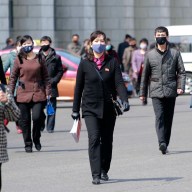HALIFAX, N.S. – Police and paramedics should both respond to incidents involving people who are extremely agitated and might be suffering from a mental illness, says a report ordered after the death of a man with paranoid schizophrenia.
The report by a panel of medical experts said first responders need to be better trained for dealing with people who are delirious, aggressive and incoherent because those people could be at risk of sudden death.
The 38-page document, which was released Friday and includes nine recommendations, was commissioned by the Nova Scotia government last year after Howard Hyde died in custody 30 hours after he was Tasered by Halifax police.
“Basically it’s going to save lives: that’s the bottom line,” said Stephen Ayer of the Schizophrenia Society of Nova Scotia and a member of the panel.
“These are good recommendations.”
The report was intended to look into mental health and excited delirium, a controversial condition that has been disputed by some medical groups in several fatalities, including Hyde’s.
Instead, the panel used the term “autonomic hyperarousal state” or AHS to describe symptoms that include paranoia, combative behaviour, profuse sweating and rambling speech – most of which Hyde reportedly displayed the night he was taken into police custody.
The panel said hospital staff and emergency health services personnel need to be trained to identify symptoms of AHS, and that people exhibiting the physical signs be treated as medical priorities.
The panel also recommended that dispatchers be trained to recognize the symptoms so police and paramedics can be sent to a call immediately with a clear protocol on how to respond.
Stan Kutcher of the Psychiatry Department at Dalhousie University in Halifax said it’s key that people showing symptoms of AHS get medical attention immediately because they are at risk of sudden death.
“It’s really important to get them treatment as quickly as possible,” said Kutcher, chairman of the panel. “This is potentially a life-threatening situation.”
Police should try to de-escalate a situation through negotiation and should use limited, brief force if necessary, said Kutcher, adding that prolonged struggles strain the body and can lead to cardiac arrest.
But the panel stopped short of recommending restrictions on the use of Tasers or other restraints, arguing there wasn’t enough data to suggest the powerful devices are linked to any sudden deaths.
Provincial Health Minister Maureen MacDonald said she had just received the recommendations and would review them to see how to proceed.
“These recommendations are a good starting point for us to improve the training and the protocol for police and EHS personnel and other first responders,” she said.
Nova Scotia’s medical examiner concluded that Hyde died of excited delirium due to paranoid schizophrenia. He said Hyde’s coronary artery disease, obesity and the restraint used by police during a struggle were all factors in his death.
An independent report commissioned more than a year ago by the RCMP criticized the use of the term “excited delirium,” which is used by police officers to describe combative, resistant suspects.
The report, ordered after a Polish immigrant died following multiple Taserings by Mounties at Vancouver International Airport last October, said the condition is not a recognized medical diagnosis and is used as an excuse to justify firing the 50,000-volt charge.












